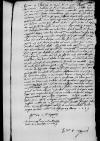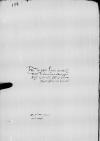Letter #2128
Ioannes DANTISCUS to Tiedemann GIESEHeilsberg (Lidzbark Warmiński), 1539-03-29
English register:
Dantiscus praises Giese’s reply to the letter from the King [Sigismund I Jagiellon]. He shares the addressee’s suspicions regarding the matters discussed in the King’s memorandum. He feels helpless in the face of the fact that fate has sent them [Stanisław Kostka], to whose influence he also attributes the admonitions of the Queen [Bona Sforza]. Meanwhile, he feels comforted by the King’s kind letter.
He would like to repay Giese by sending correspondence addressed to himself, but he has to reply to it first. He will send a messenger to the court with his own and Giese’s letters within three days.
It is unnecessary for the addressee to thank him for recommending him to the Vice-Chancellor [Samuel Maciejowski]. Dantiscus does not doubt they will find a friend and patron in him.
Dantiscus is grateful to Giese for reading his poem [Carmen paraeneticum ad Constantem Alliopagum], but he would have prefered to receive more corrections. He would be glad if Giese were right in his opinion regarding [the unnecessary excuses contained in] the introduction (proclesis) to the piece, but he is aware of his own limitations. He also explains that the fragments which seem unnecessary to Giese are a response to works he was sent previously. He has decided to refrain from publishing the poem until its addressee and inspiration [Eustachy Knobelsdorf] replies from Wittenberg.
Dantiscus demands a more exhaustive reply from Giese to his last letter.
He promises to return the records from the Cracow Diet [of the Kingdom of Poland] to Giese soon.
| received 1539-03-30 Manuscript sources:
Auxiliary sources:
Prints:
| ||||||||
Text & apparatus & commentary Plain text Text & commentary Text & apparatus
Reverendissimo in Christo Patri et Domino, domino
Reverendissime in Christo Pater et Domine, frater et amice carissime et honoran(de) or honoran(dissime)⌈honoran(de)honoran(de) or honoran(dissime)⌉.
Salutem et fraternam commendationem.
Legi heri, quae Dominatio Vestra Reverendissima ad litteras regias respondit. Quae placent et pro rerum statu commodiora esse nequeunt. Sic etiam invenio rem habere in iis, quae scheda regia[1] continentur, quemadmodum Dominatio Vestra Reverendissima suspicatur, sed quid faciemus, cum
Misissem vicissim et eas cf.
Quod gratias mihi agit Dominatio Vestra Reverendissima pro commendatione ad reverendum dominum
Gratum mihi fuit plurimum, quod Dominatio Vestra Reverendissima cf.
Nihil video in cf.
Quam diutissime valere et me commendatum haberi cupio ex animo.
Dat(ae) or Dat(um)⌈Dat(ae)Dat(ae) or Dat(um)⌉
Reverendissimae Dominationis Vestrae frater integerrimus
Postscript:
Retinui apud me acta


 BCz, 245, p. 158
BCz, 245, p. 158